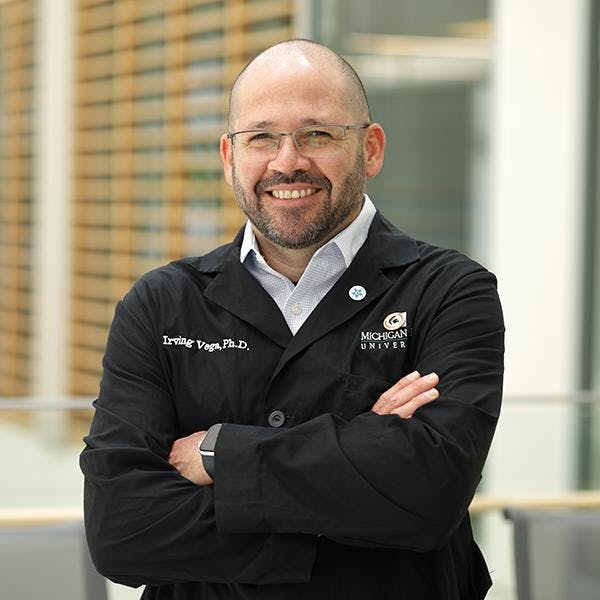Agitation, confusion and memory loss are symptoms often associated with old age. However, according to Michigan State University translational neuroscience Associate Professor Irving Vega, those cognitive and behavioral changes aren't just regular indicators of aging; they're often red flags for Alzheimer's disease.
Alzheimer's disease is a brain disorder- caused by atrophy, or shrinking, of the brain- that slowly destroys memory, thinking skills and cognitive functions. While the underlying cause remains unknown, many researchers hypothesize that it can stem from genetics, protein build-up on brain cells and lifestyle changes.
Vega's research lab looks into many aspects of the disease, but the neurological aspects of Alzheimer's are only one part of his work. A big component of his research is understanding Alzheimer's in the Latino community, as studies show they tend to have a 50% increased chance of developing the disease than white people.
Vega said there are both social and biological factors that contribute to the higher risk of Alzheimer's in the Latino population.
"Access to healthcare is a big issue," Vega said. "How you get access to preventing chronic diseases and how effective you are to deal with those chronic diseases will impact your risk later in life."
A report by the Alzheimer's Association shows that non-whites are at a higher risk of discrimination when trying to access healthcare, a fact that Vega said adds to the risk of members of Latino and Black communities trying to access healthcare.
Vega also pointed to a lack of representation among physicians and researchers, something that's important for communities to feel comfortable and not judged when seeking treatment.
Through his work, Vega said, he seeks to bridge the gap between researchers and communities. He said his research is more than asking questions and finding the answers.
"It's most important to ask what questions are important to the community that we can try to answer through research," Vega said.
Vega said this is where his work differs from that of other researchers because many in the research community will claim they were unable to find Latino or Black researchers.
However, Vega said they exist. He said they tend to be concentrated in areas outside the Midwest because of discrimination and a lack of inclusionary efforts in academic institutions located in the Central and Midwest United States, which leads to disconnect.
To combat this, Vega seeks to develop partnerships with community organizations in Michigan, inviting them to be included in the research. He has also worked to raise awareness and debunk many of the myths and misconceptions surrounding Alzheimer's.
Vega said a big misconception is the idea that Alzheimer's is strictly due to old age. Making this mistake often results in patients receiving treatment way later than they should be, he said.
"What you have when you're 65 or older is the clinical presentation of a pathological process that has started more than 20 years before the clinical presentation," Vega said.
Vega noted there are a number of ways for younger people to reduce the risk of developing Alzheimer's later in life. He pointed to exercise and a healthy diet and stressed the importance of sleep.
"We are a society that is sleep-deprived because of the hectic environment that we are in," Vega said.
A lack of exercise only perpetuates that issue because people aren't relieving stress, he said.
"It's that vicious cycle that we need to get out of," Vega said. "But it's more simple to say it than do it."
Support student media!
Please consider donating to The State News and help fund the future of journalism.
Discussion
Share and discuss “How an MSU neuroscience professor is redefining Alzheimer’s Disease research in Latinx Communities” on social media.







